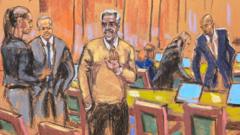Sean "Diddy" Combs' sex trafficking trial reached a pivotal moment on Tuesday as his defense team rested their case after a remarkably brief 20-minute presentation, following nearly seven weeks of testimony from federal prosecutors. The decision not to call any witnesses or present further evidence has drawn attention, particularly given the serious nature of the charges against the music mogul.
Sean 'Diddy' Combs' Defense Case Concludes with Brief Presentation in Sex Trafficking Trial

Sean 'Diddy' Combs' Defense Case Concludes with Brief Presentation in Sex Trafficking Trial
Legal team rests after 20 minutes of arguments, concluding a trial characterized by extensive prosecution testimonies.
Combs, who has denied all accusations of sex trafficking, racketeering, and transportation for prostitution, addressed Judge Arun Subramanian in court, confirming his choice not to testify. He expressed gratitude towards the judge, stating he was "doing an excellent job."
Throughout the prosecution's case, over 30 witnesses were called to support allegations that Combs utilized his celebrity status and business influence to orchestrate a criminal enterprise focused on sex trafficking. In contrast, the defense introduced text messages from Combs' ex-girlfriends to argue that the relationships were consensual. One text highlighted a victim’s enjoyment of their encounters, which Combs' lawyers described as "freak-offs."
In closing arguments anticipated later this week, Combs' attorney, Alexandra Shapiro, characterized the women involved as capable individuals who were free to leave if they wished. She contended that while Combs may have exhibited regrettable violence, it should not be conflated with sex trafficking. Conversely, prosecutors maintain that the women involved were coerced, alleging the use of drugs and violence to facilitate unwanted sexual acts.
As the trial progresses, the focus remains on the strength of the case presented by prosecutors and the implications of the defense's rapid conclusion. The final decisions on closing arguments are expected this Thursday and Friday, shaping the potential outcomes for Combs.
This case not only underscores serious allegations against a high-profile figure but also highlights the complexities involved in legal definitions surrounding consent and trafficking.
In a broader context, the case invites a discussion on the intersections of celebrity culture, power dynamics, and legal interpretations of consent and coercion in sexual misconduct cases, with implications that may resonate beyond the courtroom.
Throughout the prosecution's case, over 30 witnesses were called to support allegations that Combs utilized his celebrity status and business influence to orchestrate a criminal enterprise focused on sex trafficking. In contrast, the defense introduced text messages from Combs' ex-girlfriends to argue that the relationships were consensual. One text highlighted a victim’s enjoyment of their encounters, which Combs' lawyers described as "freak-offs."
In closing arguments anticipated later this week, Combs' attorney, Alexandra Shapiro, characterized the women involved as capable individuals who were free to leave if they wished. She contended that while Combs may have exhibited regrettable violence, it should not be conflated with sex trafficking. Conversely, prosecutors maintain that the women involved were coerced, alleging the use of drugs and violence to facilitate unwanted sexual acts.
As the trial progresses, the focus remains on the strength of the case presented by prosecutors and the implications of the defense's rapid conclusion. The final decisions on closing arguments are expected this Thursday and Friday, shaping the potential outcomes for Combs.
This case not only underscores serious allegations against a high-profile figure but also highlights the complexities involved in legal definitions surrounding consent and trafficking.
In a broader context, the case invites a discussion on the intersections of celebrity culture, power dynamics, and legal interpretations of consent and coercion in sexual misconduct cases, with implications that may resonate beyond the courtroom.



















